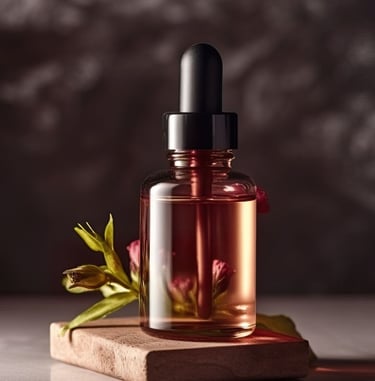Secrets of Hair Serums: A Comprehensive Guide


Introduction to Hair Serums
Hair serums have emerged as an essential component in the realm of hair care, offering a range of benefits that set them apart from traditional products like oils and conditioners. At their core, hair serums are silicone-based styling products designed to coat the surface of the hair. This coating helps in managing frizz, adding shine, and protecting hair from environmental damage, making them a versatile addition to any hair care routine.
Unlike oils, which penetrate the hair shaft to nourish and moisturize from within, hair serums primarily act on the outer layer of the hair. This distinction makes serums particularly effective for addressing issues like frizz, dullness, and split ends without weighing the hair down. Conditioners, on the other hand, are formulated to provide moisture and smoothness after shampooing, but they do not offer the same level of protection and shine as hair serums.
The concept of hair serums isn’t entirely new; their origins can be traced back to the late 20th century when the cosmetic industry began to innovate with silicone-based products. Initially, these products were marketed to professional stylists, but their popularity quickly spread to consumers seeking salon-quality results at home. Over the years, the formulation of hair serums has evolved, incorporating advanced ingredients like argan oil, keratin, and vitamins to enhance their efficacy and address a broader range of hair concerns.
In recent years, the demand for hair serums has surged, driven by an increasing awareness of hair health and the desire for manageable, shiny hair. Social media influencers and beauty experts have played a significant role in popularizing these products, showcasing their transformative effects through before-and-after comparisons. As a result, hair serums have become a staple in many individuals’ hair care arsenals, revered for their ability to deliver immediate results with minimal effort.
Types of Hair Serums
Hair serums have become a vital component in modern hair care routines, offering various benefits tailored to specific needs. Understanding the different types of hair serums available can help you select the best product for your unique hair concerns.
Anti-Frizz Serums: Designed to combat frizz and flyaways, anti-frizz serums typically contain silicone-based ingredients such as dimethicone. These serums create a protective barrier around the hair shaft, locking in moisture and preventing humidity from causing frizz. Popular products in this category include John Frieda Frizz Ease and Garnier Fructis Sleek & Shine.
Heat Protection Serums: For individuals who frequently use heat styling tools, heat protection serums are essential. These serums often contain ingredients like silicones and polymers that shield the hair from high temperatures, reducing damage and breakage. Notable examples are the TRESemmé Thermal Creations Heat Tamer and the CHI 44 Iron Guard Thermal Protection Spray.
Shine Enhancement Serums: To add a glossy finish and enhance the natural shine of your hair, shine enhancement serums are an excellent choice. These serums often include light-reflecting ingredients and oils like argan or jojoba oil. Products such as Moroccanoil Treatment and Paul Mitchell Super Skinny Serum are well-regarded for their shine-boosting properties.
Hair Growth Serums: For those seeking to promote hair growth and reduce hair thinning, hair growth serums are formulated with ingredients that stimulate the scalp and strengthen hair follicles. Common ingredients in these serums include biotin, keratin, and caffeine. Popular options in this category are the Viviscal Gorgeous Growth Densifying Elixir and the Pura D’or Hair Thinning Therapy Energizing Scalp Serum.
Key ingredients vary across different types of hair serums but often include silicones for smoothness, natural oils for nourishment, and vitamins for hair health. By understanding the specific purposes and key ingredients of each type of serum, you can make an informed decision that best suits your hair care needs.
How to Choose the Right Hair Serum for Your Hair Type
Selecting the ideal hair serum for your specific hair type and needs is crucial for optimizing hair health and achieving desired results. Hair types vary significantly, and understanding your particular hair type can guide you in choosing the right product. Here, we will delve into recommendations for straight, wavy, curly, and coily hair types, while addressing common hair concerns such as dryness, damage, and split ends.
If you have straight hair, look for lightweight serums that add shine and tame frizz without weighing your hair down. Ingredients like argan oil and silk proteins can be particularly beneficial. For wavy hair, a serum that enhances natural waves and controls frizz is ideal. Consider products with hydrating ingredients such as aloe vera and glycerin.
Curly hair often requires more moisture and definition. Opt for serums rich in oils like jojoba or coconut oil, which can penetrate deep into the hair shaft to provide hydration and manageability. Coily hair benefits from ultra-nourishing serums that combat dryness and breakage. Ingredients like shea butter and castor oil can help in maintaining moisture and strengthening hair.
When it comes to hair concerns, serums can address a variety of issues. For dryness, look for deeply hydrating serums that include humectants and emollients. Damaged hair can benefit from serums with keratin and amino acids, which help repair and strengthen the hair structure. If split ends are your concern, select a serum formulated with silicone or biotin to seal and protect the ends of your hair.
Reading product labels and understanding ingredient lists is essential for choosing the right serum. Identify key ingredients that match your hair needs, and avoid products with harmful additives like sulfates or parabens. By carefully selecting a serum tailored to your hair type and concerns, you can significantly enhance your hair care routine and achieve healthier, more manageable hair.
Application Tips and Best Practices
Proper application of hair serum is crucial to achieving the desired results, whether it’s improved shine, reduced frizz, or enhanced hair health. The first step is to determine the best time to apply the serum. For most hair types, applying hair serum on damp hair right after washing is ideal. This helps lock in moisture and provides a good base for other hair care products. However, if your primary concern is frizz control, applying a small amount of serum on dry hair can also be effective.
When it comes to the amount of serum, less is generally more. For short to medium-length hair, a pea-sized amount is usually sufficient. Longer hair may require a bit more, but it’s better to start with a small quantity and add more if needed. Over-application can lead to greasy or weighed-down hair. Dispense the serum onto your palm, rub your hands together to distribute it evenly, and then gently run your fingers through your hair. This technique ensures even distribution without clumping.
Another effective method for even application is using a wide-tooth comb. After applying the serum to your hands, spread it through your hair with your fingers, and then use the comb to distribute the product from root to tip. This not only ensures even coverage but also helps detangle the hair, making it more manageable.
Layering hair serums with other hair care products can enhance their effectiveness. For instance, after applying the serum, you can follow up with a lightweight leave-in conditioner or a heat protectant before styling. This layering approach can provide comprehensive hair care, addressing multiple concerns simultaneously. It’s important to note that serums should be applied before heavier products like oils or creams to ensure proper absorption.
Incorporating hair serum into your hair care routine can be done daily or weekly, depending on your hair type and needs. For those with dry or damaged hair, daily use can provide constant nourishment and protection. Conversely, if your hair is generally healthy, using serum a few times a week may suffice. Regular use of hair serum can significantly improve hair health, making it an essential part of any hair care regimen.
